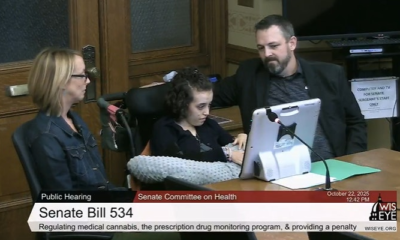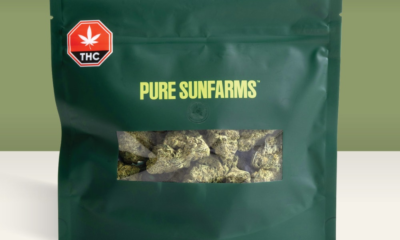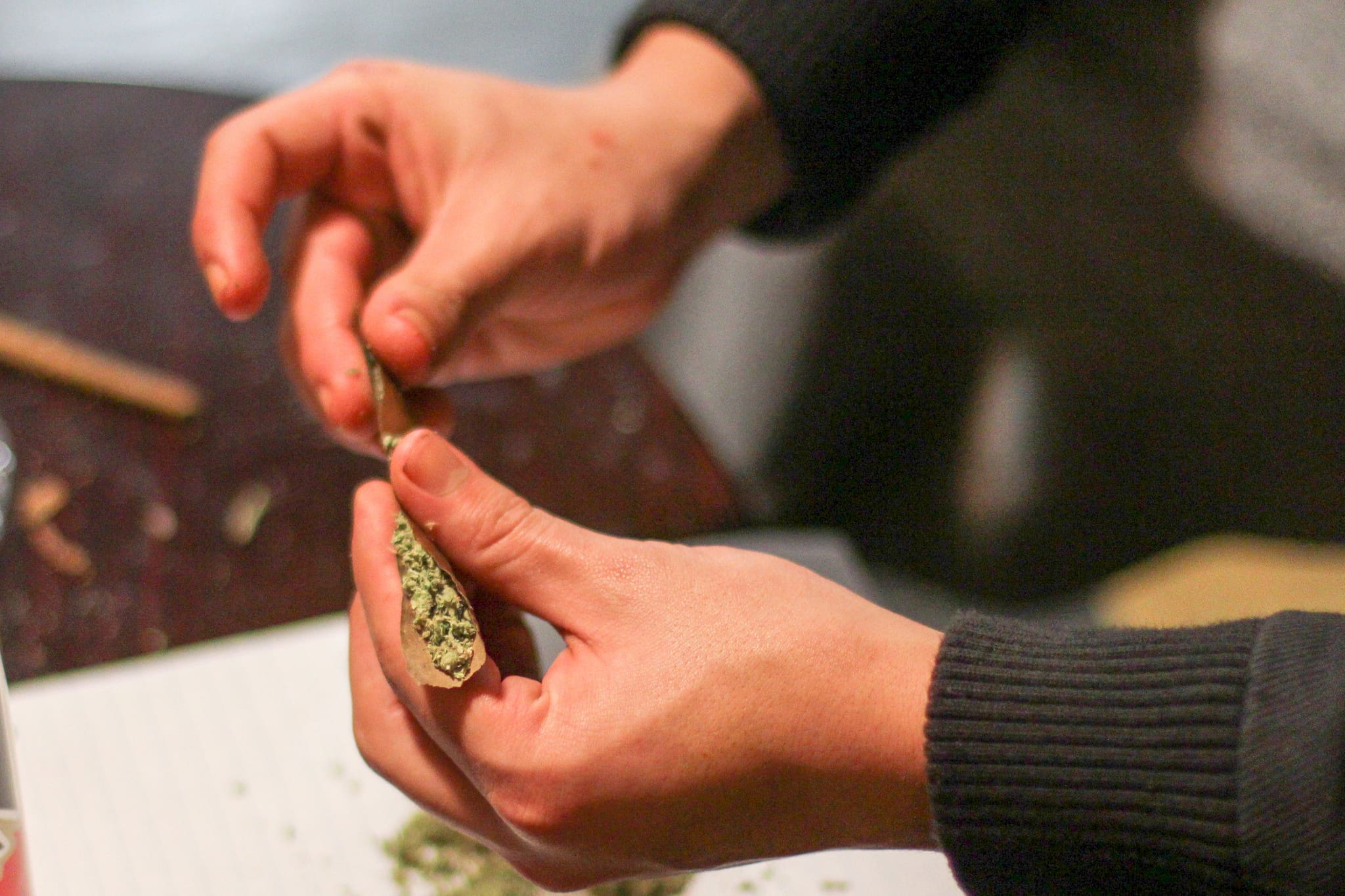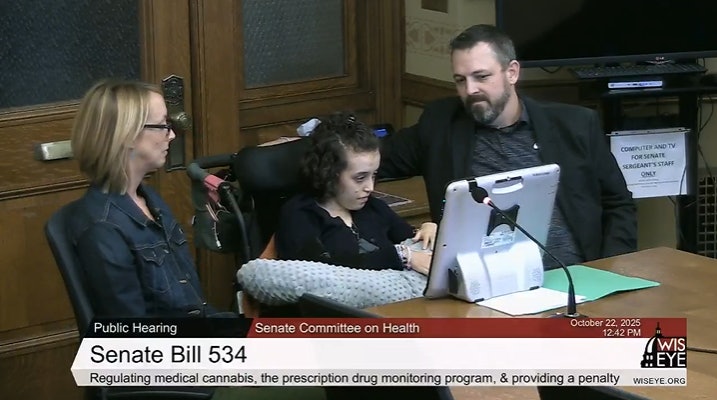featured
Maryland Police Get ‘Overwhelming’ Number Of Volunteers To Smoke Marijuana And Eat Free Lunch At DUI Training For Officers
Published
5 days agoon

Police in Ocean City, Maryland say they received an “overwhelming” number people who want to volunteer to smoke marijuana and drive a vehicle in a controlled setting for DUI recognition training purposes—with the added promise of a free lunch for participants.
Just seven hours after the Ocean City Police Department (OCPD) posted on Facebook that they were soliciting volunteers for the cannabis-impaired driving exercise, the agency on Tuesday followed up by advising the public that they had more than enough sign-ups and would not be accepting additional applications.
The department’s original post said they would be partnering with Cannabis Green Lab for the annual Maryland Highway Safety Office (MHSO) Zero Deaths DUI Conference. OCPD said it was looking to recruit 12-14 volunteers “to smoke cannabis for educational purposes while officers learn to recognize cannabis impairment.”
“The Green Lab helps both officers and participants better understand the effects and levels of impairment caused by cannabis, all in a safe, controlled setting,” it said.
Participants who are ultimately selected will need to bring their own cannabis to smoke prior to the driving exercise—but OCPD said the department will be providing free lunch to volunteers courtesy of MHSO.
Of course, driving while impaired is illegal in states that have legalized cannabis and in those that still maintain criminalization, so OCPD advised that a shuttle service will be available for participants when the exercise (and lunch time) is over.
“We’ll have about 40 student officers participating, so it’s a great way to help train the next generation of law enforcement safely and responsibly,” the department said.
Marijuana Moment reached out to OCPD for an estimate of how many sign-ups it received prior to closing the application window, but a representative was not immediately available.
Following the legalization of adult-use marijuana in Maryland, Gov. Wes Moore (D) allowed a bill to become law that prevents police from using the odor or possession of cannabis alone as the basis of a search.
Earlier this year, local officials in Montgomery County—the state’s most populous county—said they were moving to loosen marijuana policies for would-be police officers in an effort to boost recruitment amid a staffing shortage.
Meanwhile, the governor recently said that, while he’s proud that he received more votes than any prior gubernatorial candidate in the state when he was elected, there was “one thing that beat me on the ballot” in 2022: Marijuana legalization.

Author: mscannabiz.com
MScannaBIZ for all you Mississippi Cannabis News and Information.
You may like
-


FDA Weighs Petition On ‘Significant Harm’ Of Marijuana Hair Testing Device’s Positive Results From Secondhand Smoke
-


Wisconsin Lawmakers Rally for Medical Cannabis Legalization in Committee Hearing
-


Massachusetts Campaign To Roll Back Marijuana Legalization Law Is ‘On Track’ To Make 2026 Ballot, Spokesperson Says
-


Village Farms Introduces Industry-First, One-Way Aroma Valve in Cannabis Packaging
-


Ohio House Passes Bill To Remove Voter-Approved Marijuana Legalization Protections And Restrict Hemp Market
-


Sorting Robotics Becomes Cannabis Manufacturing’s First True Systems Integrator
featured
FDA Weighs Petition On ‘Significant Harm’ Of Marijuana Hair Testing Device’s Positive Results From Secondhand Smoke
Published
16 minutes agoon
October 22, 2025
The Food and Drug Administration (FDA) is considering a petition raising concerns about the alleged “significant harm” that a drug testing device for marijuana metabolites in hair could cause if employers or law enforcement administer it under the mistaken impression it proves a person actually used cannabis rather than was exposed to secondhand smoke from someone else.
The petition was submitted last week by Harmed Americans for Reform in Medical-Device Safety (HARMS), a non-profit organization focused on medical device safety founded by three experts at Northeastern Law and Tufts Medical Center. HARMS isn’t exclusively focused on cannabis issues, but the organization said an FDA-approved cannabinoid hair testing device created by the Psychemedics Corporation raises serious concerns that the agency should address.
“Our petition requests that the FDA require clearer labeling to specify that the device can be used to detect only the presence of cannabinoid metabolites in hair and cannot be used for ‘identifying marijuana use,’” as the label implies,” HARMS’s Hooman Noorchashm said in a press release. “If firms use this 510(k) device for the express purpose of ‘identifying marijuana use,’ they are not using the device properly.”
Unlike conventional saliva, urine and blood tests for THC metabolites, determining whether a person used cannabis based on hair samples is uniquely complicated because secondhand smoke exposure could be enough to lead to a positive result. HARMS is advising FDA to exercise its authority to revise the device’s labeling requirements to clarify that point.
Making that labeling change is “particularly important,” the experts said, because “the Psychemedics Device is marketed for identifying marijuana use in employment and insurance contexts, including by federal, state, and municipal law enforcement agencies.”
Cannabinoid metabolites “are detectable in hair in both purposeful use and in the case of inadvertent exposure,” the petition, which FDA has acknowledged it received, said. “So while hair testing can detect cannabinoids, it cannot definitively confirm marijuana use because ‘external contamination’ is always possible.”
While other standard THC tests can more definitively demonstrate past usage of cannabis, “hair testing of the kind used in the Psychemedic’s Device detects THC-COOH over a longer period (months) and faces additional challenges, including false positives from passive exposure (e.g., inadvertent inhalation of marijuana smoke), as well as variability in cannabinoid incorporation due to hair type, hair treatments, and growth rates.”
“Given the unreliability of hair testing to accurately identify marijuana use, the FDA should evaluate the Psychemedics label or labeling of hair testing for cannabinoids,” it says. “These concerns have real-world impact. For example, the Psychemedics Device is used in employment settings, particularly for law enforcement officers.”
“Because positive test results may reflect only passive exposure rather than intentional marijuana use, consumers (employers) may erroneously believe that a positive result definitively proves marijuana use when it showed only marijuana exposure. This kind of misunderstanding can cause significant harm to individuals who are deemed marijuana users, and may result in inappropriate medical care or adverse employment decisions. To ensure consumers and users understand the limitations of the Device, the FDA should undertake the requested actions.”
HARMS’s David Simon said that the ‘labeling and instructions for use are a crucial component of a device that is supposed to provide accurate information to consumers and users.”
HARMS filed a citizen’s petition to require the FDA to ensure clear labeling on a device that detects the presence of cannabinoids in hairhttps://t.co/ezJCmA1T5a
— David A. Simon (@david__simon) October 17, 2025
“The current instructions for use are confusingly worded, and do not achieve this goal,” he said. “Most worryingly, people’s livelihoods may be on the line if the test is not used properly.”
The petition asks FDA to recommend or order Psychemedics to revise the device’s instructions for use to read: “The Psychemedics Microplate EIA for Cannabinoids in Hair is an enzyme immunoassay (EIA) for the preliminary qualitative detection of cannabinoid metabolites in hair using a 11-nor-9-Carboxy- Δ9-THC calibrator at a cut off of 10 pg/10 mg hair.”
As an alternative, it suggests that FDA could order the company to “provide a disclaimer on the Device that it does not identify whether any test subject used marijuana but only detects the presence or absence of cannabinoid metabolites in hair, which could have occurred without the subject using marijuana.”
Marijuana Moment reached out to Psychemedics for comment, but a representative was not immediately available.
As the state legalization movement has continued to expand, the complications around cannabis drug testing policies have also gained increased attention.
In July, for example, a Rutgers University law professor published a commentary investigating how roadside tests for marijuana impairment that are widely used by police departments across the U.S. are “inadequate.” He urged policymakers to take a more scientifically robust approach to transportation safety while relying less on law enforcement’s ostensible expertise.
There’s another wrinkle to the cannabis testing debate: As acknowledged by a U.S. Department of Justice (DOJ) researcher, it’s unclear whether a person’s THC levels are even a reliable indicator of impairment.
Last October, a study preprint posted on The Lancet by an eight-author team representing Canada’s Centre for Addiction and Mental Health, Health Canada and Thomas Jefferson University in Philadelphia identified and assessed a dozen peer-reviewed studies measuring “the strength of the linear relationship between driving outcomes and blood THC” published through September 2023.
The issue was also examined in a federally funded study last year that identified two different methods of more accurately testing for recent THC use that accounts for the fact that metabolites of the cannabinoid can stay present in a person’s system for weeks or months after consumption.
Photo courtesy of Martin Alonso.

Author: mscannabiz.com
MScannaBIZ for all you Mississippi Cannabis News and Information.
featured
Wisconsin Lawmakers Rally for Medical Cannabis Legalization in Committee Hearing
Published
1 hour agoon
October 22, 2025
Wisconsin state Sen. Patrick Testin watched his grandfather, Blair Testin, a “big guy,” waste away after undergoing a series of chemotherapy treatments for lung and bone cancer that robbed his appetite.
This was in the 1990s, when California was the lone state in the nation to legalize medical cannabis. Yet the Testin family made the difficult decision to go outside the law and provide the elder Testin an alternative to pharmaceutical medicine more than 25 years ago.
Testin has been sharing the story of his grandfather for more than six years now, but his most recent testimony came Oct. 22 before the Wisconsin Senate Committee on Health, as the Badger State’s cannabis laws remain among the most restrictive in the nation, with no medical program to provide legal access to patients in need.
Testin gathered his emotions before retelling the story.
“It gave him his appetite back, and it gave him time that we probably otherwise would not have had,” Testin said Wednesday in Madison. “That story is not unique to mine. We have heard this from countless families all across the state, which is why I believe it’s time for us to enact a sensible medical cannabis program here in the state.”
A Republican from Stevens Point, Testin is rallying to make Wisconsin the 41st state to legalize medical cannabis via the passage of Senate Bill 534, legislation he’s sponsoring alongside Senate President Mary Felzkowski, R-Tomahawk.
Rep. Patrick Snyder, R-Weston, is sponsoring the proposal in the lower chamber.
The legislation intends to create an Office of Medical Cannabis Regulation to oversee a licensed marketplace and to establish and manage a patient and caregiver registry, allowing patients with qualifying conditions to access cannabis, including those with cancer, seizures or epilepsy, glaucoma, severe chronic pain, severe muscle spasms, severe chronic nausea, Parkinson’s disease, multiple sclerosis, inflammatory bowel disease, and any terminal illness with a probable life expectancy of less than one year.
“Illness does not discriminate. It affects people from all walks of life,” Testin said. “There is no doubt that each and every one of us knows someone that has suffered through an illness and struggled to find ways to make it through each day. While there are often medications that doctors could prescribe to help combat these illnesses, many come with side effects that can make living a normal life much more difficult.”
Felzkowski, 62, who was 40 years old when she was diagnosed with breast cancer and had a double mastectomy, knows those side effects personally. Ten years later, she was diagnosed with Stage 4 breast cancer.
Like Testin, Felzkowski also gathered her emotions before sharing her testimony with committee members.
“During that treatment, I lived on opioids,” said Felzkowski, who used prescription drugs for nine months to help with her pain. “The side effects of opioids are something nobody should have to live through because you take drugs; you take the opioids to control the pain so you can function through the day. … I remember sobbing to my oncologist, saying, ‘I don’t want to be a drug addict.’ And he said, ‘Well, we’ll worry about that after you survive.’”
Today, 12 years later, Felzkowski’s oncologist tells her that legalizing medical cannabis would help a lot of people by providing another tool in the toolbox.
“Here we are sitting in our ivory tower denying that for people that really need it, and it’s wrong that we’re doing that,” she said. “[It’s] not a silver bullet, but for the people out there that need it, it is that silver bullet.”
Under S.B. 534, qualifying medical cannabis patients must have written confirmation from a health care prescriber that the prescriber established a bona fide relationship with the patient. Dispensaries would be required to employ pharmacists who consult with first-time patients or caregivers to recommend daily dosages and review a patient’s medical records under the state’s Prescription Drug Monitoring Program.
Home cultivation and smokable cannabis (flower, pre-rolls, etc.) would be prohibited under the legislation.
The Senate Health Committee also took testimonies from the public on Wednesday.
Nora Lowe, a 17-year-old with a rare genetic neurological disorder called Rett syndrome, was accompanied by her parents, Megan and Josh Lowe. Nora testified through a computer audio recording.
“It affects everything I try and do,” she said. “Just like any 17-year-old, my body just doesn’t want to cooperate.”
Nora first began advocating for patient access to medical cannabis when she was 10. Seven years later, she now questions why she’s still asking for medicine that 86% of Wisconsin voters think she should have access to, according to a February 2024 survey conducted by Marquette Law School pollsters.
“My friends with Rett syndrome who use medical cannabis actually sleep through the night and see extensive relief from painful muscle spasms. Why can’t I get relief from mine?” Nora asked lawmakers. “My friends who have access to cannabis see profound improvements in their therapies and communication skills. Why can’t I experience the same types of advancement of skills? My friends with Rett syndrome who use medical cannabis are able to regulate their movements and breathing patterns, so they are more engaged in social situations. I want that. I want my breath-holding episodes to stop. I believe that I deserve the same opportunities to improve my quality of life; don’t you?”
The 17-year-old said both Democrats and Republicans agree that people like her deserve medical cannabis.
“Yet we are still at the same place we were when I was 10 years old,” Nora said.
While Republicans who control both chambers of the Wisconsin Legislature agreed last year that they should legalize medical cannabis, party leaders disagreed on the right path forward.
In 2024, Assembly Speaker Rob Vos, R-Rochester, backed a plan that called for state-run dispensaries, but that plan didn’t sit well with Senate Majority Leader Devin LeMahieu, R-Oostburg. The reform proposal died early in the session.
Snyder, the Assembly sponsor of S.B. 534, told the Senate Health Committee members on Wednesday that he’s going to twist the arm of Rep. Clint Moses, R-Menomonie, who chairs the Assembly Health Committee, to provide a hearing on the legislation.
“Let’s have it,” Snyder said. “Don’t listen to inside forces. Why are people so afraid?”
The intent is to advance language that can pass through both houses, Felzkowski said.
Testin said the legislation is up against political dynamics, both inside and outside the Legislature, that the sponsors have to navigate.
“Our hope is that this is a starting point in the conversation to get us to a point where we can get individuals comfortable with the concept, but more importantly, we have to start somewhere,” he said.

Author: mscannabiz.com
MScannaBIZ for all you Mississippi Cannabis News and Information.
featured
Massachusetts Campaign To Roll Back Marijuana Legalization Law Is ‘On Track’ To Make 2026 Ballot, Spokesperson Says
Published
2 hours agoon
October 22, 2025
A Massachusetts campaign says it is “on track” to collect enough signatures to put an initiative on the 2026 ballot that would roll back key aspects of adult-use marijuana legalization in the state. Meanwhile, some in the cannabis reform community are raising concerns about alleged instances where voters are being approached by signature gatherers with misleading information before signing petitions.
About a month after Massachusetts Attorney General Joy Campbell (D) cleared the campaign for signature gathering by certifying the recriminalization proposal, spokesperson Wendy Wakeman said the process is “going well” as they work to collect 100,000 signatures by a December 3 deadline.
“It’s on track,” Wakeman told Cannabis Business Times, while acknowledging that the “whole process—the initiative petition process—isn’t easy.”
In order to potentially qualify for the ballot, the campaign will need to submit an initial batch of 74,574 valid signatures. Internally, prohibitionist advocates have determined that they need to collect around 100,000 “because there are two different vetting processes that the signature sheets, the petitions, will go through,” and so it’s important to have that cushion for those that are potentially invalidated.
“The process at every step is political,” Wakeman said, arguing that while the voters decisively approved legalization at the ballot in 2016, there’s a sizable population of health professionals, parents and educators who are angling for a reversal of the law.
More people are feeling the “impact that the growth of marijuana use has had on the quality of life, the increase in DUI stops, the increase in child poisonings and in pet poisonings,” she said. “There’s a group that coalesces around the idea that we moved too far too fast with marijuana legalization, and that it’s not working well for Massachusetts.”
When the attorney general’s office completed its review of about 50 proposed 2026 ballot measures, it certified two versions the recriminalization campaign submitted.
Both would eliminate the state’s commercial adult-use market while maintaining patient access under the medical cannabis program and continuing to allow lawful possession of up to an ounce of recreational marijuana. “Version A” contains language that would also cap THC content for medical marijuana, while “Version B” omits that policy.
Wakeman says the campaign is pursuing the latter initiative without the cap. “We’re focusing on a petition that rolls back recreational pot stores and the legality of home-grown recreational marijuana,” she said.
Under initiative—titled “An Act to Restore A Sensible Marijuana Policy”—adults 21 and older could still possess up to an ounce of cannabis, only five grams of which could be a marijuana concentrate product.
Possession of more than one ounce but less than two ounces would be effectively decriminalized, with violators subject to a $100 fine. Adults could also continue to gift cannabis between each other without remuneration.
But provisions in the state’s voter-approved marijuana law that allow for commercial cannabis retailers and access to regulated products by adults would be repealed under the proposal.
Adults’ right to cultivate cannabis at home would also be repealed.
Meg Sanders, CEO of the Massachusetts-based Canna Provisions, told Cannabis Business Times that the question of legalization in the commonwealth has already been answered.
“I believe the voters showed up in 2016 and stated exactly what they wanted to see, which was a regulated cannabis market for adults,” she said. “I really hope we don’t have to ask and answer it again.”
“I think prohibition in any form is a real threat, and I think we have to keep our eye on the ball and not assume and not just go about our merry way. We’ll talk about it with our customers. We’ll make sure that they’re very aware of it. Please ask them to tell their friends. I just feel like we don’t know what the money behind this initiative is. We don’t understand exactly what’s backing this, but in my opinion, any threat to freedom is a threat that we need to look at.”
On Tuesday, the editor in chief of the Massachusetts-based marijuana news site Talking Joints Memo shared that a friend of his was recently approached by a person allegedly collecting signatures for the campaign who he said significantly mischaracterized the proposal by suggesting it would “stop criminalizing weed once and for all.”
Others in the industry replied to the LinkedIn post with similar experiences. But for what it’s worth, one person also flagged that they’ve heard of recent instances where petitioners have been collecting signatures for a ballot measure that isn’t actually certified.
Marijuana Moment reached out to the campaign for comment, but a representative was not immediately available.
Meanwhile, the head of Massachusetts’s marijuana regulatory agency recently suggested that the measure to effectively recriminalize recreational cannabis sales could imperil tax revenue that’s being used to support substance misuse treatment efforts and other public programs.
If enough of the initial signature submissions are validated, the proposal will then go before the legislature, with lawmakers having until May 6 to enact it into law or propose a substitute. If they do not, organizers will then need to collect 12,429 additional valid voter signatures to put the measure on the ballot.
Whether the cannabis measures make the cut is yet to be seen. Voters approved legalization at the ballot in 2016, with sales launching two years later. And the past decade has seen the market evolve and expand. As of August, Massachusetts officials reported more than $8 billion in adult-use marijuana sales.
—
Marijuana Moment is tracking hundreds of cannabis, psychedelics and drug policy bills in state legislatures and Congress this year. Patreon supporters pledging at least $25/month get access to our interactive maps, charts and hearing calendar so they don’t miss any developments.![]()
Learn more about our marijuana bill tracker and become a supporter on Patreon to get access.
—
Regulators are also working to finalize rules to allow for a new cannabis consumption lounge license type, which they hope to complete by October.
Separately, in May CCC launched an online platform aimed at helping people find jobs, workplace training and networking opportunities in the state’s legal cannabis industry.
The legislature’s Joint Committee on Cannabis Policy in August approved bills to provide employment protections for marijuana consumers and expand the state’s medical cannabis program, in part by adding post-traumatic stress disorder (PTSD) and opioid use disorder to the list of qualifying conditions.
State lawmakers have also been considering setting tighter restrictions on intoxicating hemp-derived products and a plan to allow individual entities to control a larger number of cannabis establishments.
Also in Massachusetts, legislators who were working on a state budget butted heads with CCC officials, who’ve said they can’t make critical technology improvements without more money from the legislature.
Meanwhile, Massachusetts lawmakers recently approved a bill to establish a pilot program for the regulated therapeutic use of psychedelics. And two committees have separately held hearings to discuss additional psilocybin-related measures.
Photo courtesy of Chris Wallis // Side Pocket Images.

Author: mscannabiz.com
MScannaBIZ for all you Mississippi Cannabis News and Information.

FDA Weighs Petition On ‘Significant Harm’ Of Marijuana Hair Testing Device’s Positive Results From Secondhand Smoke

Wisconsin Lawmakers Rally for Medical Cannabis Legalization in Committee Hearing

Massachusetts Campaign To Roll Back Marijuana Legalization Law Is ‘On Track’ To Make 2026 Ballot, Spokesperson Says

Village Farms Introduces Industry-First, One-Way Aroma Valve in Cannabis Packaging

Ohio House Passes Bill To Remove Voter-Approved Marijuana Legalization Protections And Restrict Hemp Market

Sorting Robotics Becomes Cannabis Manufacturing’s First True Systems Integrator

Wisconsin Senators Hold Hearing On GOP Leader’s New Medical Marijuana Legalization Bill

Tariffs And Visas Add To The Cannabis Industry’s Misery

Rhode Island Cannabis Chair Steps Down; Adult-Use Dispensary Awards Months Away

How America Accidentally Legalized Lab Cannabis

New Hampshire Lawmakers Announce Plans For Marijuana, Psychedelics And Hemp Bills For 2026 Session

Metrc Announces In-Person Events in New York to Prepare Licensees For Track-and-Trace Implementation

Top Rhode Island Marijuana Regulator Steps Down Ahead Of Possible Campaign For Attorney General

Lifestyle Brand Cookies Launches in Brazil With Premium Wellness Products

Alcohol companies lobby Congress on cannabis drinks (Newsletter: October 22, 2025)

Millennials Are Spending Big on Luxury Travel

Ohio Lawmakers Advance Bill To Scale Back Voter-Approved Marijuana Law And Impose Hemp Regulations

Data Confirms Cannabis Is Safer Than Alcohol

American Council of Cannabis Medicine Unveils Major Industry Initiative to Expand Medical Cannabis Access

Scientists Develop New Class Of CBD Using A Common Kitchen Spice—Not Cannabis

Evidence About Burning Mouth Syndrome And Cannabinoids

Raw Garden Acquires ‘California Love’ to Grow Clean Cannabis Movement

Rhode Island Marijuana Officials Approve Timeline For Awarding New Dispensary Licenses

‘Rent-a-License’ Scheme Highlights New York Cannabis’s Track-and-Trace Problem

Alert: Department of Cannabis Control updates data dashboards with full data for 2023

Connecticut Appoints The US’s First Cannabis Ombudsperson – Yes there is a pun in there and I’m Sure Erin Kirk Is Going To Hear It More Than Once!

5 best CBD creams of 2024 by Leafly

Recreational cannabis on ballot for third time in South Dakota

EU initiative begins bid to open access to psychedelic therapies
New Study Analyzes the Effects of THCV, CBD on Weight Loss

Free delta-9 gummies from Bay Smokes

5 best autoflower seed banks of 2024 by Leafly

Discover New York’s dankest cannabis brands [September 2024]

May 2024 Leafly HighLight: Pink Runtz strain

Press Release: CANNRA Calls for Farm Bill to Clarify Existing State Authority to Regulate Hemp Products

5 best THC drinks of 2024 by Leafly

Local medical cannabis dispensary reacts to MSDH pulling Rapid Analytics License – WLBT

6 best CBD gummies of 2024 by Leafly

Curaleaf Start Process Of Getting Their Claws Into The UK’s National Health System – With Former MP (Resigned Today 30/5/24) As The Front Man

Horn Lake denies cannabis dispensary request to allow sale of drug paraphernalia and Sunday sales | News

5 best delta-9 THC gummies of 2024 by Leafly

Mississippi city official pleads guilty to selling fake CBD products

The Daily Hit: October 2, 2024

Nevada CCB to Accept Applications for Cannabis Establishments in White Pine County – “Only one cultivation and one production license will be awarded in White Pine County”

5 best THCA flower of 2024 by Leafly

Weekly Update: Monday, May 13, 2024 including, New Guide for Renewals & May Board meeting application deadline

6 best hemp pre-rolls of 2024 by Leafly

PRESS RELEASE : Justice Department Submits Proposed Regulation to Reschedule Marijuana
Trending
-

 California Cannabis Updates1 year ago
California Cannabis Updates1 year agoAlert: Department of Cannabis Control updates data dashboards with full data for 2023
-

 Breaking News1 year ago
Breaking News1 year agoConnecticut Appoints The US’s First Cannabis Ombudsperson – Yes there is a pun in there and I’m Sure Erin Kirk Is Going To Hear It More Than Once!
-

 best list1 year ago
best list1 year ago5 best CBD creams of 2024 by Leafly
-

 Business1 year ago
Business1 year agoRecreational cannabis on ballot for third time in South Dakota
-

 Business1 year ago
Business1 year agoEU initiative begins bid to open access to psychedelic therapies
-

 cbd1 year ago
cbd1 year agoNew Study Analyzes the Effects of THCV, CBD on Weight Loss
-

 Bay Smokes1 year ago
Bay Smokes1 year agoFree delta-9 gummies from Bay Smokes
-

 autoflower seeds1 year ago
autoflower seeds1 year ago5 best autoflower seed banks of 2024 by Leafly



